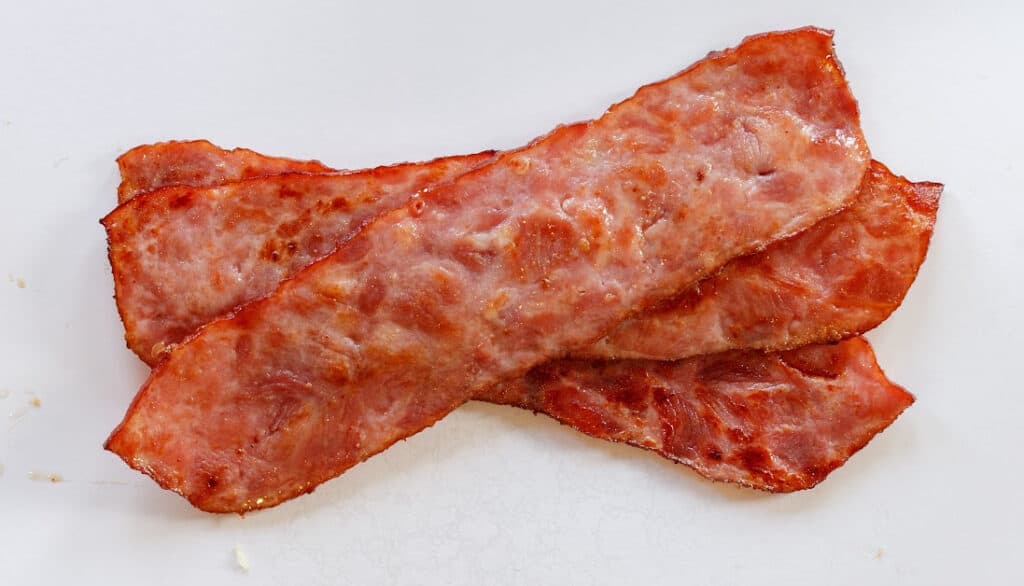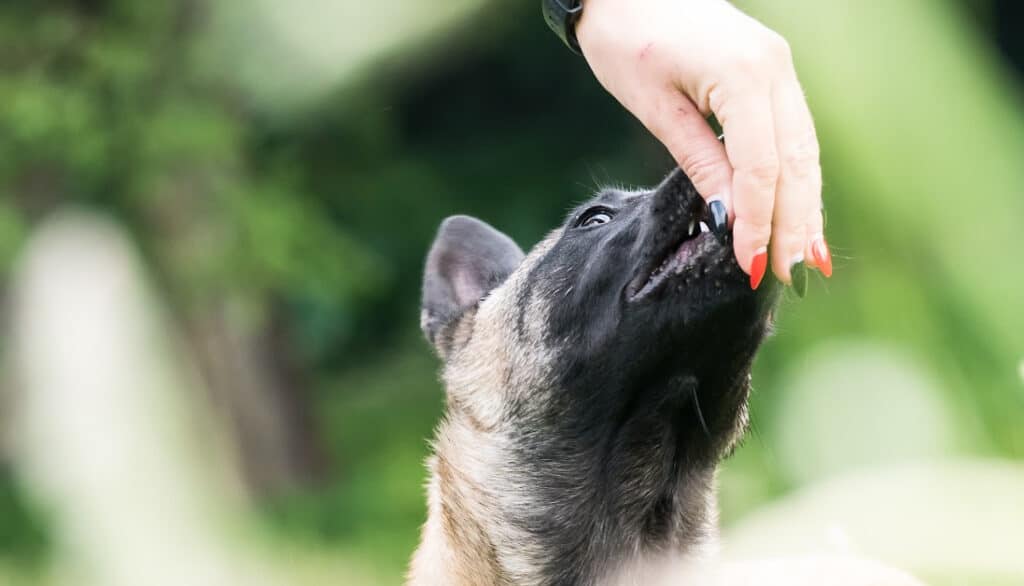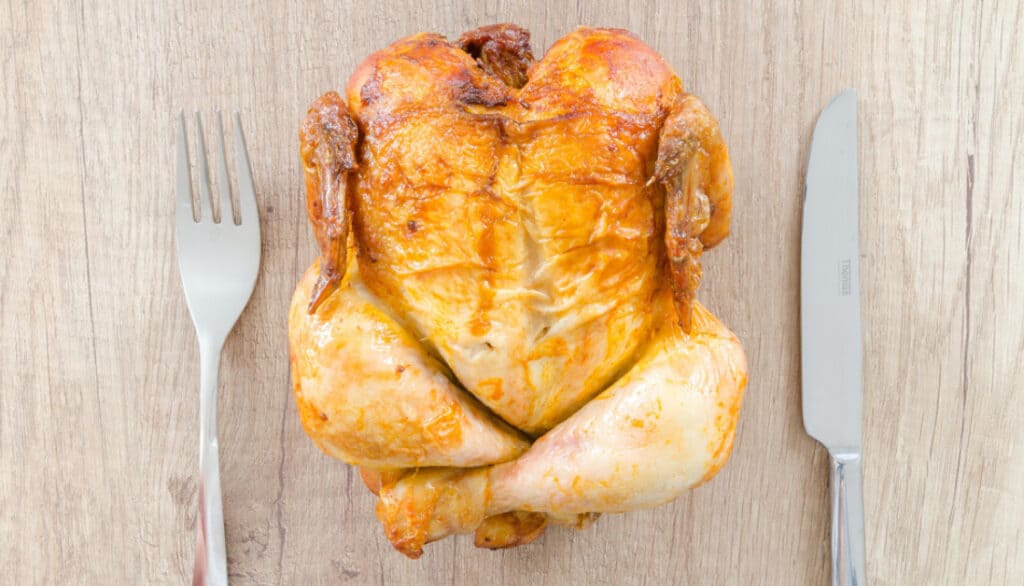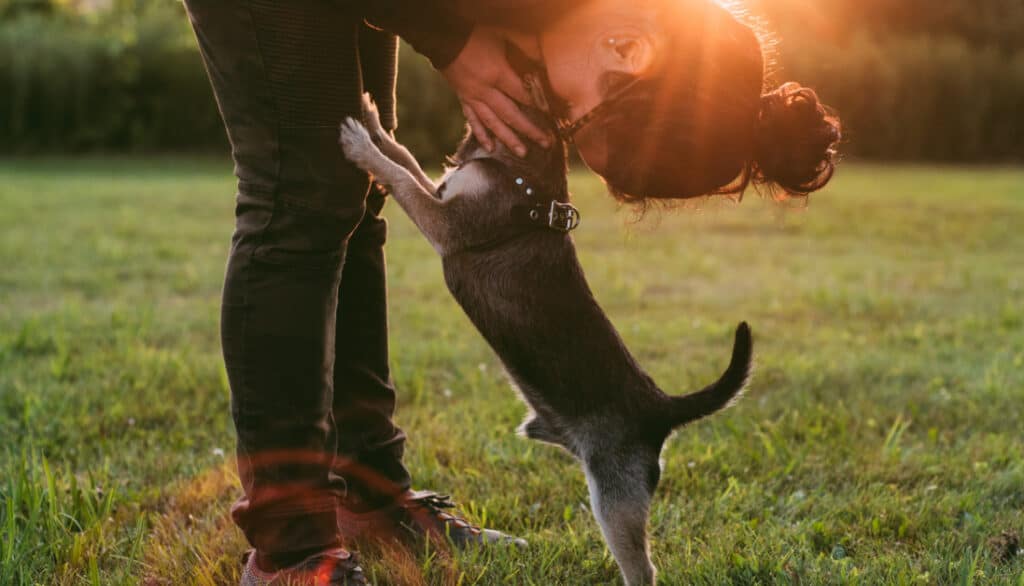Ah, the age-old question that has plagued pet owners for decades: can dogs eat turkey bacon? I get it.
You’re eating breakfast, your dog is staring up at you with those big, pleading eyes, and you’re tempted to share a little bit of your meal. But before you do, it’s important to know “whether or not it’s safe for your furry friend to indulge in this tasty treat “Can dogs eat turkey bacon?”. The short answer is yes! Dogs can eat turkey bacon.

The Purpose of This Article
The purpose of this article is to provide dog owners with all the information they need to make an informed decision about feeding their dog turkey bacon. We’ll discuss what turkey bacon is and how it differs from regular bacon.
We’ll also explore whether or not it’s safe for dogs to eat and highlight potential health risks associated with feeding dogs human food. Furthermore, we’ll delve into the benefits of feeding your dog small amounts of turkey bacon such as protein and healthy fats.
But we won’t stop there. We’ll also discuss potential risks associated with overfeeding your dog any type of human food such as obesity, pancreatitis, and gastrointestinal upset.
We’ll suggest healthier alternatives to giving your dog human food such as lean meats or vegetables. By the end of this article, you’ll have all the information you need to determine whether or not turkey bacon is a suitable treat for your furry companion.
Why is Turkey Bacon So Popular?
Turkey bacon has become increasingly popular in recent years due in part to its lower fat content compared to traditional pork bacon. Made from ground turkey meat that’s been heavily processed and flavored with various additives and preservatives before being shaped into strips resembling traditional bacon strips.
Some people prefer turkey bacon because they feel it’s a healthier alternative to regular pork-based products. While it’s true that turkey bacon has less fat and calories than traditional bacon, it’s still not considered a “health food” by any means.

Dogs and Turkey Bacon: A Dangerous Combo?
Now, let’s get down to the nitty-gritty. Can dogs eat turkey bacon? The short answer is yes, dogs can eat turkey bacon in moderation.
However, there are some things you need to keep in mind before offering your pup a slice of this delicious treat. First and foremost, it’s important to remember that dogs have different dietary needs than humans.
While we might be able to handle certain foods with ease, our pets may not be able to tolerate them as well. In fact, some human foods can be downright dangerous for dogs.
In general, it’s best to stick with foods that are specifically formulated for dogs rather than feeding them human food. But if you do want to give your furry friend a taste of something from your plate, it’s important to make sure the food is safe for them to consume.
The Risks of Feeding Your Dog Too Much Turkey Bacon
While small amounts of turkey bacon are generally safe for dogs to eat as an occasional treat, overfeeding your dog any type of human food can lead to health problems down the road. For example:
- Obesity: Dogs who consume too many calories from treats like turkey bacon may quickly become overweight or obese.
- Pancreatitis: Overfeeding your dog with fatty meats like pork or turkey bacon can cause inflammation in the pancreas.
- Gastrointestinal upset: Giving your dog too much rich or fatty food can cause stomach upset such as vomiting or diarrhea. It’s important to remember that just because something is safe for humans doesn’t mean it’s safe for our furry friends.
As always, moderation is key when it comes to indulging our pets’ taste buds. Stay tuned for the next section, where we’ll explore the benefits of feeding your dog small amounts of turkey bacon.

What is Turkey Bacon?
If you’re a fan of bacon, you may have heard of turkey bacon. It’s a type of bacon that is made from ground turkey meat and has a similar texture and appearance to traditional pork bacon. While it’s not as popular as regular bacon, some people prefer it for various reasons.
How does turkey bacon differ from regular bacon?
Unlike pork, which is high in saturated fat, turkey meat is leaner and contains less calories per serving. Turkey bacon typically has fewer calories than traditional pork bacon, making it an attractive option for those who are health-conscious or looking to lose weight.
Additionally, turkey bacon contains less cholesterol than its pork counterpart. In terms of taste and texture, turkey bacon can be slightly different from regular pork belly strips.
It tends to have a milder flavor that some people find more palatable than the strong taste of pork. The texture can also be different – while pork belly strips are typically chewy and fatty, turkey strips tend to be leaner and crispier.

Why do some people prefer turkey bacon?
There are several reasons why someone might choose to eat turkey instead of traditional pork belly strips. For example, if someone is trying to reduce their intake of saturated fat or cholesterol in their diet due to health concerns such as high blood pressure or heart disease.
Another reason could be that they simply prefer the taste over regular pork because it has less grease and fat content. It may also appeal to those who follow religious dietary restrictions that prohibit eating certain types of meats like beef or pig.
Some people also choose to eat only halal (permissible under Islamic law) meat products for religious reasons. In this case, they will typically look for halal-certified brands when shopping for food items like Turkey Bacon.
Overall, whether you prefer the taste or are concerned about your health, turkey bacon is a delicious and healthy alternative to regular pork bacon. However, it’s important to remember that moderation is key, as with any type of food.
Can Dogs Eat Turkey Bacon?
It’s no secret that dogs love the smell and taste of bacon, but what about turkey bacon? While turkey bacon is generally considered safe for dogs to eat in small amounts, it should not be a regular part of their diet. Why?
Because most types of bacon, including turkey bacon, are high in fat and sodium, which can be harmful to your dog’s health if consumed in excess. In moderation, however, turkey bacon can provide some nutritional benefits for your dog.
It’s a source of protein and healthy fats that can help support their overall health and well-being. But before you start feeding your dog turkey bacon on a regular basis, let’s take a closer look at the potential risks associated with giving dogs human food.

Potential Health Risks Associated with Feeding Dogs Human Food
While many human foods are safe for dogs to eat in moderation, some can be harmful or even toxic. For example, foods like chocolate, grapes and raisins, avocado, onions and garlic can cause serious health problems if consumed by dogs.
Additionally, feeding your dog too much human food (including turkey bacon) can lead to obesity or other health issues over time. When it comes specifically to turkey bacon though – the biggest risk is its high salt content which could lead to dehydration if consumed too frequently or in large quantities.
Some brands also contain artificial preservatives that may not agree with your furry friend’s digestive system. It’s always best to err on the side of caution when feeding your dog human food – even something as seemingly harmless as turkey bacon – so always make sure to check with your veterinarian before introducing new foods into their diet.
The Benefits of Feeding Your Dog Turkey Bacon
While it is important not to overdo it on the turkey bacon, there are some benefits to feeding your dog this type of human food. For starters, it is a good source of protein that can help support muscle growth and repair. Additionally, turkey bacon contains healthy fats that can help support your dog’s skin and coat health.
When choosing a brand of turkey bacon for your dog, look for one that is low in sodium and free from any artificial preservatives or additives. Also, make sure to feed it in moderation – as an occasional treat or training reward rather than a regular part of their diet.

Risks of Feeding Your Dog Too Much Turkey Bacon
As mentioned earlier, the biggest risk associated with feeding your dog too much turkey bacon (or any type of human food) is obesity. Dogs who consume too many calories from treats and table scraps are at risk of packing on extra pounds over time – which can lead to a range of health problems including joint pain, heart disease, and diabetes.
Additionally, consuming too much salt can lead to dehydration which could have serious short-term effects on their wellbeing if not addressed immediately by increasing water intake. If you do decide to give your dog turkey bacon as an occasional treat or training reward, make sure to keep track of how much they’re consuming so you don’t inadvertently put them at risk for health issues down the road.
Alternatives to Feeding Your Dog Turkey Bacon
If you’re looking for healthier alternatives to feeding your dog human food like turkey bacon – there are plenty of options available! Some dogs enjoy raw fruits and vegetables such as carrots or apple slices as treats while others prefer lean meats like chicken or fish. Just remember: always check with your veterinarian before introducing new foods into your dog’s diet – even if they seem harmless – so you can be sure that they won’t cause any harm in the short or long term.

The Benefits of Feeding Your Dog Turkey Bacon
Protein Boost
Turkey bacon is an excellent source of protein for dogs. Protein is essential for building and repairing tissues, muscles, and bones. It also helps to maintain a healthy coat, skin, and nails.
One ounce of turkey bacon contains around 6 grams of protein. This is particularly beneficial for active or working dogs who require more protein in their diets.
Healthy Fats
Not all fats are bad for your dog, and turkey bacon contains healthy fats that are important to your dog’s health. Omega-3 fatty acids and omega-6 fatty acids are both found in turkey bacon which can help maintain a healthy coat and skin. These fats also promote brain development and support immune system function.
Source of Vitamins & Minerals
Turkey bacon is not only an excellent source of protein but also vitamins and minerals such as vitamin B12, niacin, selenium, phosphorus, zinc, and magnesium among others that your furry friend needs to stay healthy.
An Excellent Training Treat
Dogs love treats! And using turkey bacon as a training treat will surely be a hit with most dogs! As mentioned before turkey bacon is high in protein so you don’t have to give them much – one slice cut into small bites will go a long way!
No Artificial Preservatives
Unlike regular pork-based bacon that contains artificial preservatives such as nitrites which can be harmful to dogs’ digestive system; turkey bacon usually contains fewer preservatives. So you have less reason to worry about the adverse effects on your dog’s health. Overall feeding your dog small amounts of turkey bacon should not cause any harm as long it’s given in moderation which means no more than two slices per day (for large breeds) and one slice for smaller breeds.
Remember, overfeeding your dog any human food can lead to obesity which is not good for their health. It’s always better to consult with a vet before feeding them anything new and observe them closely for any signs of discomfort or digestive issues when they try something new.

The Risks of Overfeeding Your Dog Turkey Bacon
While feeding your dog small amounts of turkey bacon may provide some health benefits, it’s important to remember that too much of any human food can be harmful to your furry friend. Here are some potential risks associated with overfeeding your dog turkey bacon:
Obesity
Turkey bacon is high in fat and calories, which makes it a tasty treat for dogs. However, if your dog consumes too much turkey bacon, they may start to put on extra weight. Obesity in dogs can lead to a range of health problems, including heart disease, joint pain and diabetes.
Pancreatitis
Dogs who eat too much fatty food like turkey bacon are at risk of developing pancreatitis, which is an inflammation of the pancreas. Symptoms include vomiting, diarrhea, and abdominal pain. In severe cases, pancreatitis can be fatal.
Gastrointestinal Upset
Feeding your dog too much turkey bacon can also cause gastrointestinal upset such as diarrhea or constipation. This is because their digestive system is not designed to handle large amounts of fatty or processed foods like humans.

Allergic Reactions
Sometimes dogs may have an allergic reaction to certain foods like turkey bacon. Common signs include itching, hives and swelling around the face or mouth area. While uncommon in most dogs when it comes to turkey bacon specifically it’s best to observe any symptoms that might develop right after they’ve been fed this type of meat.
Nutritional Imbalance
Another potential risk associated with feeding your dog excessive amounts of human food like turkey bacon is that their diet may become unbalanced nutritionally which means they might miss out on essential vitamins and minerals found in dog food. This can lead to health issues down the line.
It’s important to remember that while turkey bacon may seem like a harmless treat, dogs should only be fed it in moderation as part of a balanced diet. To avoid any potential health risks associated with overfeeding your dog, always consult with your veterinarian before introducing new foods into your dog’s diet.

Alternatives to feeding your dog turkey bacon
The problem with feeding dogs human food
Feeding dogs human food is a common practice among pet owners, but it isn’t always the healthiest option. While some human foods, like lean meats and vegetables, can be beneficial for dogs in moderation, many foods that are safe for humans to eat can be harmful or even toxic to dogs. In addition, feeding your dog too much human food can lead to weight gain and other health issues.
Lean meats as an alternative
If you’re looking for a healthier alternative to turkey bacon, consider lean meats like chicken or turkey. These meats are high in protein and low in fat, making them a great source of nutrition for your dog. Just be sure to remove any bones before feeding them to your furry friend.
Chicken:
Chicken is a great source of protein for dogs and is often used in commercial dog food. It’s also low in fat and easy on the digestive system. To feed chicken to your dog, cook it without any seasoning or spices and remove any bones before serving.
Turkey:
Like chicken, turkey is another great source of protein that’s low in fat. It’s also rich in vitamins B6 and B12, which help promote healthy skin and coat. When feeding your dog turkey, make sure it’s cooked without spices or seasonings and free of bones.

Veggies as an alternative
Vegetables are another healthy alternative to giving your dog human food that’s high in fat or sodium. Many vegetables have vitamins and minerals that are important for a balanced diet.
Carrots:
Carrots are an excellent source of fiber and vitamin A. They’re also low in calories which makes them ideal for overweight dogs who need to lose a few pounds. You can feed carrots to your dog raw or cooked, just make sure they’re cut into bite-sized pieces.
Green beans:
Green beans are a great source of fiber and vitamins C and K. They also contain small amounts of protein, making them a healthy alternative to high-fat human foods. You can feed green beans to your dog raw or cooked.
While it’s natural to want to share our food with our furry friends, it’s important to remember that not all human foods are safe for dogs. When in doubt, stick with commercial dog food or talk to your veterinarian about which human foods are safe for your dog in moderation. By choosing healthier alternatives like lean meats and vegetables, you’ll be providing your furry friend with the nutrition they need without exposing them to unnecessary health risks.

Conclusion
After much consideration, it is evident that dogs can eat turkey bacon, but only in moderation. Turkey bacon is a great source of protein and healthy fats for your furry friend, but it should not be a staple in their diet. As with any human food, it is essential to consult with your veterinarian before introducing it to your dog’s diet.
Remember that overfeeding your dog any type of food, including turkey bacon, can lead to obesity and other health issues such as pancreatitis and gastrointestinal problems. It is crucial to watch the amount of turkey bacon you give your dog and ensure that they are getting all the necessary nutrients they need from their regular dog food.
If you decide to feed your dog turkey bacon, make sure it is fully cooked and free from any added spices or ingredients that may be harmful to dogs. Also, be mindful of feeding them too much at once as this can lead to an upset stomach or diarrhea.
There are many healthier alternatives to turkey bacon that you can give your dog if you’re concerned about their overall health. Lean meats like chicken or fish are great options that provide essential nutrients without the added fat and sodium found in processed meats like turkey bacon.
Vegetables like carrots or green beans also make excellent treats for dogs. If given in moderation and under proper supervision from your veterinarian, dogs can enjoy eating turkey bacon as a treat occasionally.
However, it is crucial not to rely on human food as a primary source of nutrition for our furry friends. Always consult with a vet before introducing any new foods into their diet!
